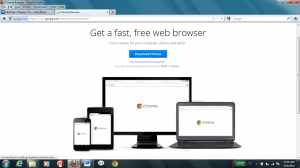Phoenix TS Intern

Mozilla Firefox and Google Chrome are essentially the holy grail of web broswers used by, well, everyone. Currently, they are the two most popular web browsers.
Despite their popularity, are they really secure? Even if you, like me, think you have nothing of value to share with hackers, believe it or not, your information is worth something to someone.
Using Bugzilla for Mozilla
Mozilla mentions numerous security holes they repaired recently for the Firefox browser. They place these security holes in four categories depending on their level of impact; critical, high, moderate or low threat levels. They also provide a service called Bugzilla, where you can enter keywords that describe the bug you suspect and see if anything was reported. If you are the first to report the bug, you may even reap the benefits with a reward.
Is Chrome’s password manager good for personal security?
Google Chrome lets users save their passwords for numerous websites with a password manager. I currently use a computer that at least one other person uses when I’m not in the office. When I entered my information it asked me to save my password. When I declined the option, it recommended that I save my password again – how ironic.
This convenience of saving your passwords and forgetting about them may come at a major cost. To check up on yourself, you can access your password manager and all saved passwords for Chrome by going into the “Settings” and clicking on “Manage Saved Passwords” in the advanced settings.
Relying on a password manager could potentially pose a huge risk if you let someone borrow your computer, if it is stolen, or if you use a “community computer.” A hacker would only have access to these passwords if they had access to your computer, but once they do, they’ve hit the jackpot.
Have no fear. There are steps you can take to ensure you don’t put yourself at risk. Google Chrome has a site to help you manage and delete these saved passwords.
The question still remains, which web browser is safer?
What it comes down to is personal preference. In a online browser poll – Firefox got a higher score than Chrome in terms of trustworthiness. Almost double the amount of people preferred Firefox over Chrome.
It is not entirely clear why this is the case, but the company who conducted the poll has a few theories. Generally, people have a distrust for Google in general because as a company it seems to have no problem selling user information for profit.
Also, recently both of the web browsers faced major vulnerabilities. Those who use these web browsers at work are asked to update to the latest versions to help thwart these issues.
Perhaps the question of internet browsing security shouldn’t focus on what browser you use, but the way you use it. A large part of failed security relies on good security practices, specifically with password management.
Passwords: The good, the bad, and the ugly
There are three types of passwords; the good, the bad and the downright awful. Let’s start with the worst kinds of passwords. These passwords are composed of the “all too common” pieces of information about a person: their dog’s name, mother’s maiden name, birthday, home address.
Some of the painfully obvious password choices are “123456”and the word “password”. Passwords that are slightly better contain words with some numbers thrown on the end such as “samsung345”. While these use a combination of letters and numbers, a skilled hacker only deals with minor speed bumps to access your information.
The best kinds of passwords include a combination of capital and lowercase letters as well as numbers and symbols. Instead of making your password: Ilovedunkindonuts5, you could make it 1L0v3dunk1nd0nut5. Tricky passwords are challenging to remember. Make it something that you won’t forget.
Another tip stresses creating passwords using at least eight characters with mixed symbols. It is wise to change your password several times a year. If you can’t come up with complicated passwords on your own, there are plenty of password generators available online.
The type of web browser you use and smart password management emphasize two key components of good personal security practice. It’s essential to invest in necessary security measures such as antivirus software as well.
As Benjamin Franklin once said: “An ounce of prevention is worth a pound of cure.” It is worth the extra step.
subscribe by email
Stay Ahead
Related Posts
-
Cyber Security
The Most Common Phishing Attacks and How to Spot Them
January 17, 2025
-
Cyber Security
6 Tips for Keeping Your Devices Safe While Traveling
December 24, 2024
-
Cyber Security
The Benefits of Earning the EC-Council Certified Threat Intelligence Analyst (CTIA) Certification
September 13, 2024
